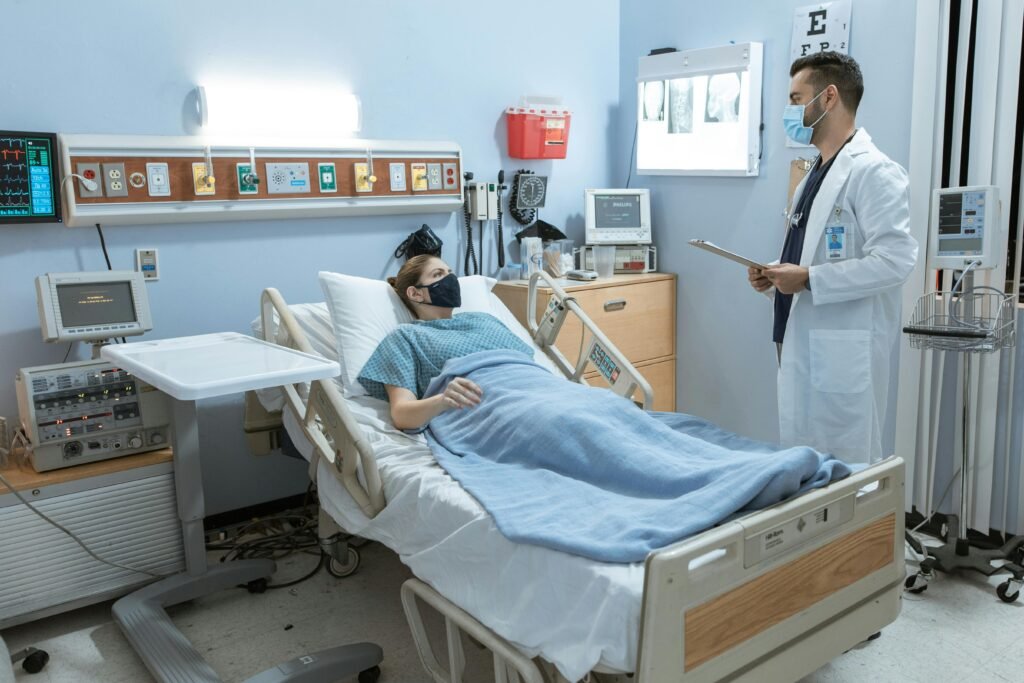Introduction to Weight Loss Treatment Facilities
When it comes to achieving a healthy weight, there’s often more to it than eating right and exercising. Many people find that despite their best efforts, lasting weight loss can be challenging. That’s where weight loss treatment facilities come in. These centers are designed to provide professional guidance, personalized plans, and a supportive environment for individuals struggling with weight management. Let’s explore what these facilities are, who can benefit from them, and how they can help transform your weight loss journey.
What Are Weight Loss Treatment Facilities?
Weight loss treatment facilities are specialized centers that provide a structured and professional approach to weight management. Unlike at-home programs or general fitness centers, these facilities focus entirely on weight loss, often incorporating medical, nutritional, psychological, and physical fitness services tailored to each person’s needs.

Why Consider Professional Weight Loss Assistance?
Losing weight isn’t a one-size-fits-all journey. Some people may struggle due to medical issues, psychological barriers, or a lack of structured guidance. Weight loss facilities offer a comprehensive approach to help you overcome these obstacles, creating a clear path to achieving and maintaining a healthier weight.
Who Can Benefit from Weight Loss Treatment Centers?
Anyone struggling with obesity, individuals with weight-related health conditions, or those who’ve tried and failed to maintain weight loss through self-directed programs can benefit from a professional facility. These centers are especially helpful for people who need an immersive, structured approach with access to medical and psychological support.
Types of Weight Loss Treatment Facilities
Each weight loss treatment facility offers unique programs tailored to various needs. Here’s a closer look at the main types:
Medical Weight Loss Clinics
Medical weight loss clinics are facilities that offer programs supervised by healthcare professionals, such as doctors and registered dietitians. They often provide a medically structured program, including health assessments, blood work, and, if necessary, prescription medications or other medical interventions.
Role of Healthcare Professionals in Medical Clinics
In medical clinics, healthcare professionals play a vital role in creating safe, personalized weight loss plans. They can monitor health metrics, adjust medications, and provide insights that aren’t available in non-medical settings, making these facilities ideal for individuals with underlying health concerns.
Behavioral Therapy Centers
These facilities emphasize the mental and emotional aspects of weight loss. Behavioral therapy centers address issues like emotional eating, stress-related overeating, and other psychological barriers that can hinder weight loss.
The Importance of Mental Health in Weight Loss
Mental health is crucial for sustainable weight loss. Behavioral therapy helps individuals build a healthier relationship with food, understand their emotional triggers, and adopt positive coping strategies, promoting long-term success beyond just losing pounds.

Residential or Inpatient Weight Loss Programs
For individuals who benefit from a more immersive experience, residential programs provide a structured daily routine focused on healthy habits. Residents live on-site, allowing them to fully focus on their health goals without daily life distractions.
Structure and Daily Life in a Residential Program
Residential programs often include scheduled meals, fitness sessions, therapy appointments, and educational workshops. The highly structured environment helps individuals build discipline and establish routines that are essential for maintaining weight loss.
Fitness and Wellness Retreats
These retreats offer a less clinical approach to weight loss, often located in scenic environments. They emphasize physical fitness and stress relief, making them a popular choice for those looking to jumpstart a healthy lifestyle or detox from their usual routine.
Unique Focus on Fitness-Oriented Programs
Wellness retreats focus heavily on physical activity, providing classes like yoga, hiking, strength training, and more. Their primary aim is to help guests establish a strong foundation for physical fitness and general wellness, which can complement weight loss.

Weight Loss Camps
Weight loss camps are typically geared toward specific age groups, like teens or adults, and emphasize group support, outdoor activities, and a structured daily schedule.
Programs Tailored for Different Age Groups
These camps are ideal for people who enjoy a team environment and need a social aspect to stay motivated. They create a fun, supportive atmosphere, blending healthy eating, regular exercise, and camaraderie.

Key Services Offered by Weight Loss Treatment Facilities
Each type of facility provides unique services to support weight loss and promote long-term health.
Medical Supervision and Health Assessments
Medical assessments are a key part of many weight loss programs, especially those that target individuals with existing health conditions. Facilities often conduct initial and periodic health checks, including blood pressure, cholesterol, and blood sugar monitoring, to ensure a safe and effective program.
Personalized Diet and Nutrition Counseling
Registered dietitians help develop a customized nutrition plan that fits individual dietary needs, preferences, and lifestyle. Whether you have food allergies, specific dietary requirements, or unique health goals, a personalized approach can make a significant difference.
Exercise and Fitness Programs
Most facilities offer structured fitness programs that can include a range of activities, from low-impact exercises to intense workout sessions. Fitness experts design these programs to match your fitness level, gradually increasing intensity as you progress.
Behavioral and Psychological Support
Therapists or counselors may offer one-on-one sessions, group therapy, and educational workshops to address emotional eating and other psychological factors that can impact weight loss. This type of support is invaluable for long-term success, as it helps you develop healthier ways to cope with stress and emotions.
Benefits of Choosing a Weight Loss Treatment Facility
Weight loss treatment facilities provide numerous advantages over self-guided weight loss methods.
Professional Supervision and Expertise
Having healthcare professionals guide your journey can make all the difference. With access to a team of experts who understand both the medical and lifestyle aspects of weight loss, you’ll benefit from tailored advice and a structured program.
Access to Resources and Support Systems
Weight loss facilities offer resources such as fitness equipment, dietary supplements, meal plans, and mental health support. Having these resources readily available can make your weight loss journey smoother and less overwhelming.
Accountability and Structured Programs
Facilities emphasize accountability by offering a structured environment with regular check-ins, scheduled meals, and planned workouts. This structure helps individuals stay focused and committed to their goals.

What to Expect During Your Stay at a Weight Loss Facility
Understanding what daily life at a weight loss facility looks like can help you feel more prepared and comfortable with the idea.
Daily Routines and Schedules
Many facilities have a set schedule to keep guests on track. This typically includes meal times, exercise sessions, therapy or counseling appointments, and educational workshops.
Physical and Mental Health Evaluations
Evaluations help tailor the program to meet your evolving needs, ensuring that your weight loss journey is both safe and effective. You may undergo periodic assessments to monitor your progress and adjust your plan as needed.
Dietary and Fitness Adjustments Over Time
Weight loss plans are rarely static. As you progress, facilities often adjust meal plans and fitness routines to align with your changing needs, energy levels, and weight goals.
How to Choose the Right Weight Loss Treatment Facility
Selecting the right facility can be a bit overwhelming. Here are some factors to consider:
Factors to Consider
Location and Accessibility
The location of a facility is important, especially if you plan to attend regularly or want family members to visit. Choosing a convenient location can help you maintain your commitment.
Program Duration and Cost
Program lengths and costs vary widely among facilities. Make sure you choose a program that fits your budget and time constraints.
Staff Credentials and Facility Reviews
Qualified staff and positive reviews can make a difference. Research the qualifications of the facility’s professionals and look for feedback from former clients to ensure you’re making the right choice.
Cost of Weight Loss Treatment Facilities
Weight loss treatment facilities can be a financial investment, but understanding the cost structure can help you prepare.
Typical Expenses Involved
Costs vary based on the facility type, services offered, and program duration. Some clinics may charge on a per-session basis, while others have all-inclusive packages.
Insurance and Financing Options
Some facilities accept insurance, particularly those offering medically supervised programs. Additionally, financing options may be available to help manage the cost.
Success Rates and Patient Experiences
Exploring success rates and hearing from past patients can give you a realistic perspective on what to expect.
Average Success Rates Across Facility Types
Success rates vary based on the type of facility and individual factors. Medical clinics and residential programs typically report higher success rates, as they offer more structured support.
Patient Testimonials and Case Studies
Patient testimonials can provide insight into what life at a facility is like and whether the program helped them achieve their goals.
Pros and Cons of Weight Loss Treatment Facilities
While these facilities offer numerous benefits, they’re not without drawbacks.
Advantages of Structured Support
Structured support, professional guidance, and access to resources make these facilities highly effective for many people.
Potential Downsides to Be Aware Of
Some facilities may be expensive, and not everyone can adjust to a strict daily routine. It’s essential to consider if this type of commitment aligns with your lifestyle and budget.
Weight Loss Facilities vs. At-Home Weight Loss Programs
Let’s compare professional facilities with at-home weight loss programs.
Key Differences
Weight loss facilities offer a more structured, hands-on approach compared to at-home programs. They provide access to experts, medical supervision, and a supportive community, which can be beneficial for those who struggle to lose weight on their own.
When to Opt for Professional Help Over Self-Guided Programs
If you’ve tried multiple diets and exercise routines without success, or if you have health conditions that require medical oversight, a professional facility may be a more suitable choice.

Frequently Asked Questions (FAQs)
Are weight loss treatment facilities effective long-term?
Yes, weight loss treatment facilities can offer long-term effectiveness, especially for individuals who struggle to lose weight on their own. These facilities often provide structured support, behavioral counseling, and personalized diet and exercise plans, all of which can create sustainable habits. However, long-term success depends on following the guidance provided during and after the program, along with ongoing commitment to lifestyle changes.
Can insurance cover weight loss treatment facilities?
Insurance coverage for weight loss treatment facilities varies. Some insurance plans cover specific types of programs, especially those involving medical supervision, such as clinics that treat obesity or weight-related health conditions. It’s recommended to check with your insurance provider to understand coverage options and if any documentation or referrals are needed to qualify.
What is the typical duration of a program at these facilities?
The duration of a weight loss program can range from a few weeks to several months, depending on the facility type and the individual’s goals. Shorter programs (like wellness retreats) may last a week or two, while inpatient or residential programs may span 30, 60, or even 90 days. Some facilities also offer ongoing outpatient support or maintenance plans after the primary program ends.
How can I prepare for a stay at a weight loss facility?
To prepare, it’s helpful to mentally commit to the program and prepare to adopt new habits. Pack comfortable clothing, especially activewear, and any personal items that support your wellness routine, like a journal or fitness tracker. It’s also beneficial to set realistic goals and communicate any dietary preferences, medical conditions, or concerns with the facility staff in advance.
Is it possible to get support for weight maintenance after completing a program?
Yes, many facilities offer follow-up programs or support for maintaining weight loss. This may include periodic check-ins, counseling sessions, access to online resources, or even local support groups. Some facilities provide virtual or in-person consultations to help you stay on track and handle challenges as they arise, making long-term success more achievable.


